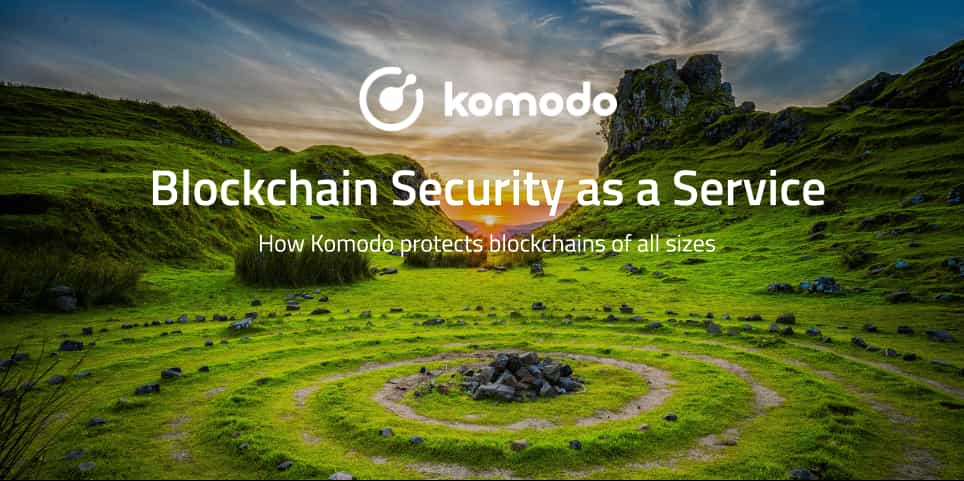In June 2021, dPoW switched to the Litecoin network for more efficient cross-chain notarizations.
In the world of blockchain technology, security is of paramount importance. With the rise of decentralized applications and cryptocurrencies, ensuring the safety of your blockchain project is essential to gain the trust of users and investors. This article explores how Komodo's Blockchain Security Services, powered by delayed Proof of Work (dPoW), offer robust protection for your blockchain, making it resilient against potential attacks and securing its reputation in the ever-evolving digital landscape.
The Vulnerability of Most Blockchains
Many blockchain projects lack inherent security measures, leaving them vulnerable to various forms of attacks. It's not a matter of if, but when, such projects will be targeted by malicious actors. When a blockchain is not adequately secure, it becomes an attractive target for hackers, putting the entire ecosystem at risk.
The High Cost of Insecurity
The consequences of a successful attack on a blockchain project can be catastrophic. Stolen funds are just the tip of the iceberg. Negative media coverage and a loss of trust in the project can have lasting repercussions. In an era where the crypto industry is striving for legitimacy, security breaches can undermine the progress made and tarnish the reputation of blockchain technology as a whole.
A Lucrative Target
What makes matters worse is that cyberattacks on blockchains are often cost-effective and highly profitable for attackers. Tools like Crypto51.app showcase how cheaply many blockchains can be subjected to a 51% attack, which is one of the most commonly used vectors for malicious activities in the blockchain space.
Komodo's Industry-Wide Security Solution
Komodo's Blockchain Security Services offer a comprehensive solution to safeguard blockchain projects. The beauty of these services is that they are not limited to the Komodo ecosystem; any blockchain using a hashing algorithm and following the UTXO model can benefit, regardless of its consensus mechanism or hashing algorithm.
Protecting Against 51% Attacks
One of the primary features of Komodo's Security Service is protection against 51% attacks. This attack vector is prevalent, and Komodo's solution adds an extra layer of security to deter potential thieves from targeting your blockchain.
Preserving Reputation
When a successful attack occurs, it erodes confidence in a blockchain project. By adopting Komodo's Blockchain Security Service, you can preserve the integrity of your project, ensuring that it continues to inspire trust and confidence among its stakeholders.
Safeguarding Progress
Insecure blockchains may face delisting from centralized exchanges, hindering the progress they've made. Komodo's security solution can help you maintain your listing, ensuring that the hard work you've put into your project remains intact.
Focus on Your Passion
Outsourcing security to Komodo allows you to concentrate on what you're most passionate about—making your blockchain project a success. Instead of worrying about security threats, you can focus on user growth, innovation, and achieving your project's goals.
Endorsements from Experts
Don't just take our word for it. Prominent figures in the blockchain industry have recognized the value of Komodo's security solutions:
- Scott Roberts (zawy), a Difficulty Algorithm Expert, states, "Komodo [dPoW] is the only way I know of (currently) to get high security in small and medium coins without hardly any centralization."
- The Einsteinium Foundation shares their experience, saying, "The Einsteinium network experienced a real 51% attack. Komodo dPoW, that we implemented in our code recently, kicked in and protected the chain."
- The GameCredits Foundation expresses excitement about the Komodo integration, stating that it "offers an extra layer of security that very few other POW coins currently have."
How Komodo's Blockchain Security Service Works
At the heart of Komodo's Blockchain Security Service is the innovative delayed Proof of Work (dPoW) security mechanism. Here's how it works to protect integrated blockchains using the power of the Litecoin network:
- A block hash from every protected blockchain is securely stored on the Komodo (KMD) chain using the OP_RETURN command. This added layer of security enhances the integrity of all previous transactions.
- Every ten minutes, a block hash from the KMD chain is recorded on the Bitcoin (BTC) ledger, extending Litecoin-level security to all transactions that occurred before the most recent notarized block.
This continuous process ensures that all integrated chains are safeguarded with the robust security of the Litecoin network, all at a fraction of the cost.
Securing Your Blockchain with Komodo
Komodo's Blockchain Security Service is not limited to its own blockchains. It's an industry-wide solution available to all UTXO-based blockchains, regardless of their consensus rules. To learn more about securing your blockchain with Komodo, contact one of Komodo's certified solutions providers today.
Conclusion
In a world where blockchain security is the cornerstone of trust, Komodo's Blockchain Security Services offer a compelling solution for blockchain projects of all sizes. By safeguarding against 51% attacks, preserving your project's reputation, and allowing you to focus on your passion, Komodo empowers you to build and grow with confidence. Don't leave the security of your blockchain to chance; choose Komodo for blockchain security that's as strong as the foundation of the digital world itself.
Delayed Proof Of Work (DPoW) FAQs
Are Notary Nodes The Same Thing As Masternodes?
Not at all. Technically speaking, Notary Nodes and Masternodes do not share any similarities.Masternodes typically have special powers, such as the ability to provide lightning payments or privacy features. Both Proof of Work (PoW) and Proof of Stake (PoS) blockchain networks can have Masternodes.To run a Masternode on a project’s network, you must hold a significant investment in that project’s currency. For this investment of funds and services, Masternode operators are rewarded with a certain percentage of block rewards. On the other hand, Notary Nodes are dedicated servers that perform notarization transactions. You do not need to hold any KMD to become a Notary Node operator.
Anyone can become a Notary Node operator by getting elected in Komodo’s annual Notary Node election.Most of the Notary Node network’s notarization transactions occur on the Komodo blockchain itself, which writes important blockchain data from all dPoW-protected blockchains onto the KMD ledger. Then, roughly every 2.5 minutes, Notary Nodes also perform one notarization transaction on the Litecoin blockchain, providing BTC-level security to all dPoW chains.Apart from participating in notarization transactions, Notary Nodes have no special powers. They do not have the power to approve or reject transactions or blocks. They do not have the power to decide which blocks get validated by a blockchain’s network; all ordinary consensus rules still apply.
Notary Nodes simply perform cross-chain notarizations after the network has come to consensus on which block should be notarized.Each Notary Node is given the opportunity to mine one block with an easy difficulty level roughly every 100 blocks. As the KMD blockchain has one minute block times and 3 KMD block rewards, this amounts to roughly 1500 KMD per month per Notary Node. This incentivizes talented system administrators to act as Notary Node operators in the Komodo ecosystem.
Is DPoW Permissioned?
dPoW is not permissioned, as it is a completely open source technology. Anyone can adopt dPoW by setting up their own Notary Node network and integrating dPoW to their blockchain. Using Komodo’s Notary Node network is permissioned, in the sense that any blockchain that wishes to integrate with the network must work closely with the Komodo Dev Team. Komodo’s Notary Node network must make updates to start notarizing a new blockchain.dPoW is not permissioned in the sense that the Komodo team decides who can use dPoW and who cannot.
Everyone is welcome to adopt dPoW and the Komodo team has never denied a request from a blockchain project that wants to start using Komodo’s Notary Nodes for dPoW.It’s important to bear in mind that, in a way, all blockchains are permissioned, in some sense of that word. For example, only core developers can approve changes to a blockchain’s source code. Allowing anyone to make changes to a blockchain’s soure code would introduce major security vulnerabilities. The same is true for dPoW— allowing any blockchain to integrate to the Notary Node network without supervision from the Komodo Dev Team would present security risks.
As such, projects that want to use Komodo’s Notary Nodes must work closely with the Komodo Dev Team.It’s important to re-emphasize that using Komodo’s Notary Node network is not a requirement for adopting dPoW. Setting up a notary node network is costly and time-consuming, but it is an option available to those concerned about using Komodo’s permissioned Notary Nodes.
Is DPoW The Same As Or Similar To DPoS?
No, dPoW and dPoS are completely different. They don’t have much in common, apart from the first 3 letters of their acronyms.Delegated Proof of Stake (dPoS) is a specific implementation of Proof of Stake (PoS) consensus rules that uses voting and and election processes to provide security. In short, all holders of a dPoS coin vote on which “witnesses” or “delegates” that they would like to entrust with the power of creating and validating blocks. Since all dPoS witnesses are heavily invested in the currency of that particular blockchain, it is assumed that it’s in their own interest to behave and validate blocks honestly.
Delayed Proof of Work (dPoW) is a second-layer security mechanism that works in addition to a blockchain’s ordinary consensus rules. dPoW provides Litecoin-level security through a series of cross-chain notarizations. These notarizations are performed by Komodo’s Notary Node network.Unlike witnesses or delegates in a dPoS system, Notary Nodes do not have the ability to create, validate, reject, or change transactions or blocks.Although Notary Node operators are chosen in an annual stake-weighted election, there is no voting or electoral procedure involved in the functioning of dPoW itself. Instead, dPoW relies on network-wide consensus to decide which blocks to notarize. Then, the Notary Node network simply follows the notarization orders they’ve been given.

